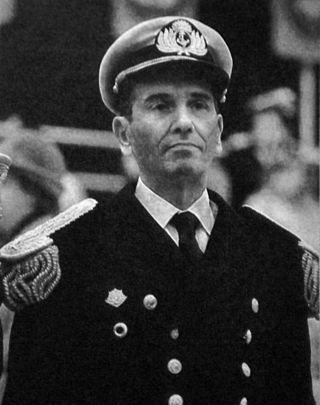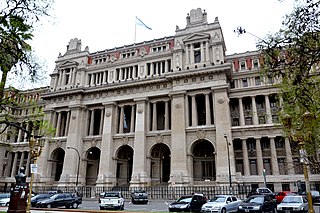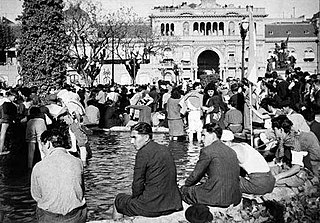The politics of Argentina take place in the framework of what the Constitution defines as a federal presidential representative democratic republic, where the President of Argentina is both Head of State and Head of Government. Legislative power is vested in the two chambers of the Argentine National Congress. The Judiciary is independent, as well as the Executive and the Legislature. Elections take place regularly on a multi-party system.

The president of Argentina is both head of state and head of government of Argentina. Under the national constitution, the president is also the chief executive of the federal government and commander-in-chief of the armed forces.

Lieutenant General José Félix Benito Uriburu y Uriburu was the President of the Provisional Government of Argentina, ousting the successor to President Hipólito Yrigoyen by means of a military coup and declaring himself president. From 6 September 1930 to 20 February 1932, he controlled both the Executive and Legislative branches of government. As "President of the Provisional Government," he acted as the de facto Head of state of Argentina. His was the first of a series of successful coups d'état and unconstitutional governments that came to power in 1943, 1955, 1962, 1966, and 1976.

Admiral Jorge Isaac Anaya was an Argentine admiral and Commander-in-Chief of the Argentine Navy. He was born in Bahía Blanca, in the province of Buenos Aires. He participated in the right-wing military dictatorship known as the National Reorganisation Process (1976–1983) and, along with Leopoldo Fortunato Galtieri and Basilio Lami Dozo, was a member of the Third Military Junta that ruled Argentina between 1981 and 1982. He was the main architect and supporter of a military solution for the long-standing claim over the Falkland Islands that led to the Falklands War.

The Political Constitution of Colombia of 1991, is the Constitution of the Republic of Colombia. It was promulgated in Constitutional Gazette number 114 on Thursday, July 4, 1991, and is also known as the Constitution of Human Rights. It replaced the Political Constitution of 1886 and was issued during the presidency of the liberal César Gaviria, with ideas from the also liberal Luis Carlos Galán.

The Supreme Court of Argentina, officially known as the Supreme Court of Justice of the Argentine Nation, is the highest court of law of the Argentine Republic. It was inaugurated on 15 January 1863. However, during much of the 20th century, the Court and the Argentine judicial system in general, lacked autonomy from the executive power. The Court was reformed in 2003 by the decree 222/03.

Argentine Revolution was the name given by its leaders to a military coup d'état which head the government of Argentina in June 1966 and began a period of military dictatorship by a junta from then until 1973.
The history of Argentina can be divided into four main parts: the pre-Columbian time or early history, the colonial period (1536–1809), the period of nation-building (1810–1880), and the history of modern Argentina.

The 2009 Honduran constitutional crisis was a political dispute over plans to either rewrite the Constitution of Honduras or write a new one.

The 2009 Honduran coup d'état, which took place during the 2009 Honduran constitutional crisis, occurred when the Honduran Army, following orders from the Honduran Supreme Court, ousted President Manuel Zelaya on 28 June 2009 and sent him into exile. Zelaya had attempted to schedule a non-binding poll to hold a referendum on convening a constituent assembly for writing a new constitution. Despite court orders to cease, Zelaya refused to comply, and the Honduran Supreme Court issued a secret arrest warrant dated 26 June. Two days later, Honduran soldiers stormed the president's house in the middle of the night, detained him, and thwarted the poll. Instead of putting him on trial, the army put him on a military plane and flew him to Costa Rica. Later that day, after reading a resignation letter of disputed authenticity, the Honduran Congress voted to remove Zelaya from office and appointed Head of Congress Roberto Micheletti, his constitutional successor, to complete his term. This was the first coup to occur in the country since 1978.

Loyalty Day is a commemoration day in Argentina. It remembers 17 October 1945, when a large labour demonstration at the Plaza de Mayo, in downtown Buenos Aires, demanded the liberation of Juan Domingo Perón, who was jailed in Martín García island. It is considered the foundational moment of the Peronist movement.
A Necessity and Urgency Decree is a special kind of order issued by the President of Argentina. Unlike regular decrees, which are used in Argentina for rulemaking, a DNU has the force of law. Once the President promulgates a DNU, it comes into force almost immediately; afterwards, the National Congress must examine the decree to determine whether it will be allowed to remain in force or not.

The 1943 Argentine coup d'état, also known as the Revolution of '43, was a coup d'état on 4 June 1943 that ended the government of Ramón Castillo, who had been fraudulently elected to the office of vice-president before succeeding to the presidency in 1942 as part of the period known as the Infamous Decade. The military was opposed to Governor Robustiano Patrón Costas, Castillo's hand-picked successor, a major landowner in Salta Province and a primary stockholder in the sugar industry. The only serious resistance to the military coup came from the Argentine Navy, which confronted the advancing army columns at the Navy Petty-Officers School of Mechanics.
In Argentina, there were six coups d'état during the 20th century: in 1930, 1943, 1955, 1962, 1966 and 1976. The first four established interim dictatorships, while the last two established dictatorships of permanent type on the model of a bureaucratic-authoritarian state. The latter conducted a Dirty War in the line of State terrorism, in which human rights were systematically violated and there were tens of thousands of forced disappearances.
Alejo Castex was a distinguished lawmaker of the Viceroyalty of the Río de la Plata and of the United Provinces, where he was president of the Supreme Court and also a congressman.

Argentine nationalism is the nationalism of Argentine people and Argentine culture. It surged during the War of Independence and the Civil Wars, and strengthened during the 1880s.
The history of the Constitution of Chile dates from 1811. There were 10 constitutional texts and a draft for a federal organization in 1826. Its common elements are the unitary form of state and presidentialism as a form of government.
The presidential line of succession de Argentina the order in which officials can assume the office of the President of Argentina in case of vacancy due to illness, death, resignation or removal.









